Alabama coal mine keeps digging after hundreds of fines and a fatal explosion
This article originally appeared on Inside Climate News, a nonprofit, independent news organization that covers climate, energy and the environment. It is republished with permission. Sign up for their newsletter here.
By Lee Hedgepeth and James Bruggers, Inside Climate News
OAK GROVE, Ala.—Clara Riley and her family had a lot of questions. But on Monday, as they gathered around the 90-year-old’s small kitchen table, they weren’t getting many answers.
Kristie Baggett, a representative of Crimson Oak Grove Resources LLC, a mining company, had come to the home after the Rileys expressed concern about a water well located in Clara’s storage room.
They knew there’d been a water well at the home of their neighbor, W.M. Griffice, who died several weeks after his home above a longwall coal mine the company owned exploded on March 8. His grandson was critically injured in what was a devastating blast that left little in its wake but the scorched Alabama clay.
Griffice, 84, had presciently told his granddaughter that he felt like his home would explode, given the methane fumes he’d been living with.
The explosion that would lead to Griffice’s death had rattled the windows of the Riley home, Clara Riley said, and has continued to rattle her entire community.
Now, just weeks after the explosion, as they sat around Riley’s kitchen table, her family was trying to get answers from Oak Grove as its mine branches out below the town and slowly encroaches upon the earth beneath her home. They weren’t having much luck.
“What do you think happened up at W.M. Griffice’s?” Riley’s daughter, Pam White, asked the mine representative during the meeting.
“I can’t speak on it right now,” Baggett said, sighing. “There’s still things going on, and I can’t speak on it.”
But even what Baggett did say concerned the Rileys, the family said. Baggett told them that capping their well would be the ideal solution. Venting was also a possibility, she said, but given that the well is located inside the home, venting may be more difficult. “Plugging wells,” Baggett said, is the mine company’s preference.
“I’d like to plug every one of them,” she said.
“But that’s our concern,” a family member responded, referring to Griffice, now deceased. “They plugged his, too, and we don’t want to be blown to smithereens.”
The members of the Riley family are among hundreds of residents of the Oak Grove and Adger communities in west Jefferson County, Alabama, facing the prospect of continued longwall mining below their homes and commercial establishments that many say has destroyed their way of life. From the Baptist church to the local park to gas stations and beyond, nothing has been left unaffected by mining activity.
Now, residents like the Rileys believe their safety is imminently at risk from the mine, especially now that the Griffice family has alleged in a lawsuit that the explosion that obliterated its homestead and killed the family patriarch was caused by leaks from what one former federal regulator has called a “gassy” seam of coal.
Experts interviewed by Inside Climate News said the explosion and related issues like the well in the Riley home present serious risks to public safety that warrant immediate intervention from regulators.
Meanwhile, while one federal regulatory agency has cited the mine more than 150 times since the explosion, another simply referred questions about the plight of Oak Grove citizens to a state agency. For their part, state mine regulators have been largely silent as to any formal investigation into the cause of the home explosion. All the while, mine operations have continued unabated.
“We’re all in the path of destruction,” said Tony Humphreys, a Riley relative and neighbor. “And they just want us to stay out of their way.”
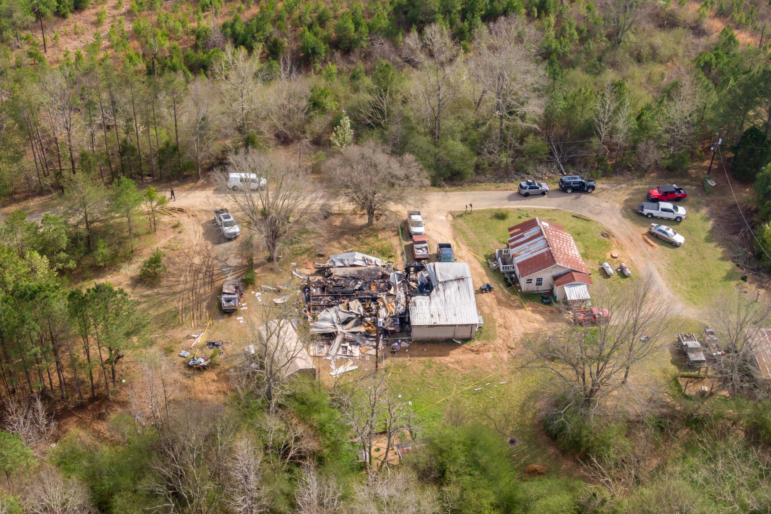
The impacts of longwall mining
In Alabama and across Appalachia, the potential for methane escaping from underground coal mines is ever-present.
Methane occurs naturally in coal seams. An explosive threat to miners, methane vapors have long been known to cause fires or blasts in or near homes when it has leaked to the surface.
The Oak Grove Mine, located less than an hour outside Birmingham, uses the destructive longwall method in which bladed machines shear coal from expanses as wide as 1,000 feet, hauling coal out of an area that can extend well over a mile. The rock ceiling, called “overburden,” then collapses behind the cutting tool.
When the ceiling of the mine collapses, the ground above the mine sinks, sometimes by several feet, even though it may be hundreds of feet above the mine, said Jack Spadaro, a former top federal mine safety engineer who works as a consultant for coalfield residents, workers and their lawyers.

The slumping cracks rock underground, creating fissures that can empty water wells or drain ponds. Methane can find its way up through new cracks in rock or through water well pipes.
Damage from mining activity, and even an increased risk of surface explosions, is not unheard of when longwall mining is involved.
Last summer, for example, Inside Climate News reported on a community in West Virginia where land atop an expanding metallurgical coal mine had sunk several feet, with property owners going to court in an attempt to hold a coal mining company accountable. At least one family had to leave their home because explosive levels of methane were coming up from a water well a few feet from the back door.
A community rattled
In Oak Grove, the signs of trouble are everywhere.
As you travel through the rural community, it’s hard to miss.
“OAK GROVE MEMORIAL PARK,” a large, weathered sign reads in the center of the community. “Park Closed Temporarily. 7-1-23.”
The park, with a football field and other facilities, had become part of the community’s heartbeat in the wake of an April 1998 F-5 tornado that killed 34 people across Alabama, including more than a dozen in Oak Grove. The Oak Grove School, which had been located at the current site of the park, was leveled. The school was rebuilt nearby, and the memorial park was opened at its former site. Now, it’s not what’s above ground that’s put the park at risk.
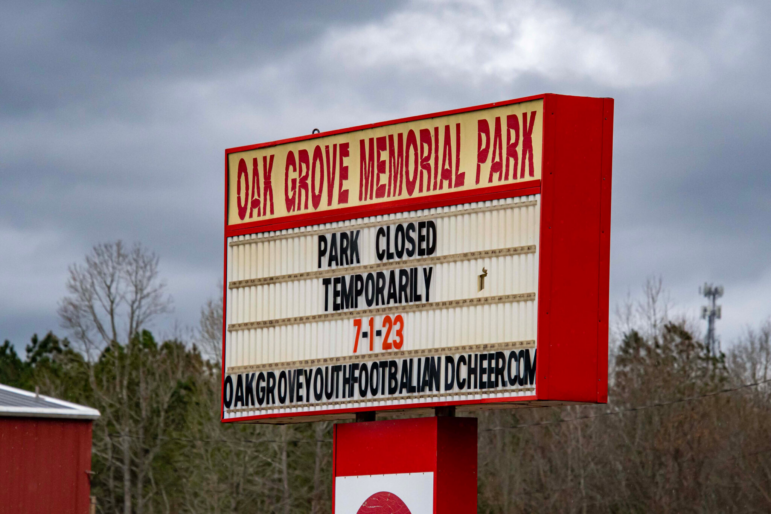
“The park is being mined under and this is a safety precaution,” a board of residents who run the park posted on social media at the time of the initial closure. “The gates will be locked so please do not enter the property during the period the park is closed. The park will reopen as soon as it is safe to return.”
Nearly a year later, the park is still closed, its gates chained and padlocked shut.
Just across the street, the foundation of what had been a gas station remains. It was one of two fueling stops in the small community. Now, in the wake of underground mining, it’s been torn down. Subsidence and fuel tanks don’t mix. The other gas station, the Grove, remains open, though its gas pumps go unused.
“Just as a precaution we are taking out the tanks so if the ground settles, there is no contamination,” its owners said at the time. “Our goal is to build a new gas station with new tanks after [the] ground settles. We appreciate all the support from our Oak Grove community.”
“Condemned,” red tags on the station’s pumps now read, black trash bags over their handles.
Services, at least, have resumed at Oak Grove First Baptist Church. They had been “temporarily displaced,” church officials had announced, while mining took place underneath.
For one resident who asked to remain unnamed, that’s little consolation. On Monday, she said she’s concerned that once the ground near the church settles, her late husband’s gravestone will be ruined.
“I don’t think a cemetery should be undermined,” she said. “The cemetery is a holy site. You’ve placed your people there. To me, that is morally wrong.”
But her late husband’s gravesite isn’t her only concern. The home she’s lived in with her new husband—a home he built by hand—is crumbling, a result of mining activity by Crimson Oak Grove Resources, according to the family. The couple asked to remain anonymous because they are still in negotiations with the mine over the value of their home.
No residents interviewed by Inside Climate News want to leave Oak Grove. The Rileys have lived on the same land for more than 100 years, they said. They tried to explain what that means to Baggett, the mine representative, during Monday’s meeting.
The family described a pole barn that’s been in the family for generations. Its assessed value, they explained, would be little to nothing. What it means to them, though, is much more.
“There’s no pain and suffering?” Humphreys asked Baggett, confirming that any compensation from the mine company would include damages for the family’s struggle.
“No,” she said.
A tragedy in Alabama
In early March, less than a mile away from Clara Riley’s place, Griffice and his grandson Anthony Hill, 21, were resting in their home when the small house exploded, leaving little but the charred Alabama clay in its footprint. Both Griffice and Hill were transported to a Birmingham hospital in critical condition, authorities said. Griffice died on April 3 from his injuries, according to his family.
“He enjoyed hunting, fishing, and his dogs,” his obituary said. “He retired as a construction worker and equipment operator. He loved his family and friends.”
In the wake of the explosion, an Inside Climate News investigation confirmed that the Griffice home was located above proposed longwall mine panel 52, operated by Crimson Oak Grove Resources. Regulatory maps confirmed that mining was scheduled to reach the area beneath the Griffice home in February, just days before the explosion occurred. In its lawsuit, the family has alleged that Oak Grove Mine, its parent company, and a contractor are responsible for the explosion and, ultimately, for Griffice’s death.
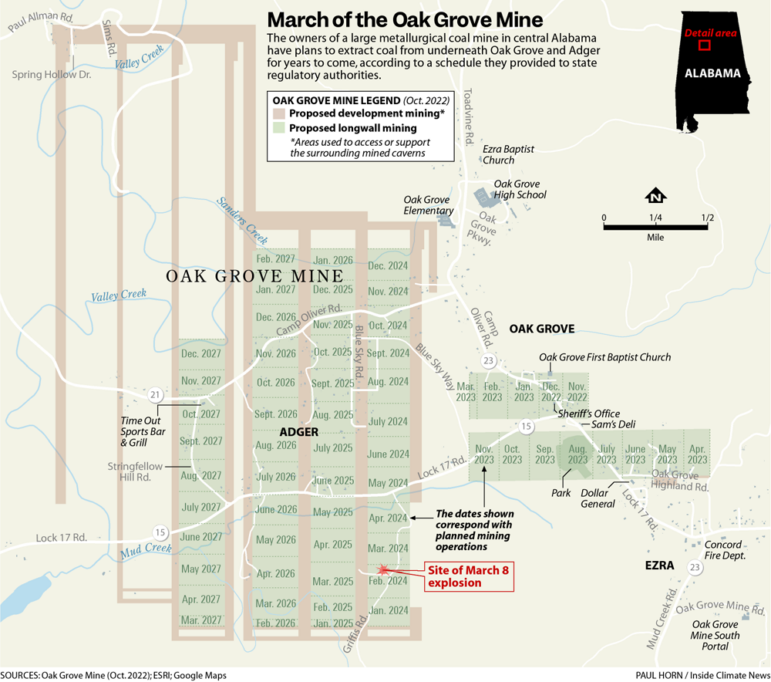
In a response filed Friday, Sean W. Shirley, a lawyer for Crimson Oak Grove Resources, argued that many of the Griffice family’s claims are barred under Alabama law. As long as the mine was in “substantial compliance” with applicable mining permits, its lawyer argued, Crimson Oak Grove Resources could not be found to have acted in an “intentional, wanton, or willful” way.
Shirley, a lawyer at a major Birmingham law firm, Balch & Bingham, has represented large companies in similar litigation, including serving as the “lead counsel for a gas pipeline contractor relating to gasoline distribution pipeline explosion involving two deaths and three significant personal injuries,” according to the firm’s website.
Ample regulators, little action
So far, there has been little evidence that state regulatory officials are moving to act decisively in the face of the March explosion or even formally determine whether the March explosion was caused by mine operations.
State fire marshals, who are typically charged with investigating similar tragedies, have not responded to requests for comment. Kathy Love, director of the Alabama Surface Mining Commission, has said her agency and others are “researching this devastating event,” but did not provide details about any formal investigation.
“We, as well as all other agencies are saddened and very much concerned over this tragic event,” she said in response to questions. “All agencies want to determine as best as possible the underlying cause.”
In a later interview with ICN, Love expressed skepticism that the explosion could have been caused by mining activity given the depth at which shearing takes place, but said her opinion was based on her experience, not on any particular information about the Oak Grove tragedy.
Love worked in a public accounting firm auditing coal mines before she transitioned into a role at the state regulatory agency, she said. In the decades she’s been involved in roles related to the mining industry, Love said she’d never heard of an above-ground explosion like this one.
“So it just blows my mind,” Love said. “It’s very unusual.”
Love said only three formal complaints have been filed against the mine in the last 10 years, but she would not provide copies of those complaints, citing privacy concerns related to property owners’ personal information. All three complaints, Love said, were related to damage from subsidence potentially caused by the Oak Grove Mine.
State regulatory records show that the mine has been cited by state officials multiple times, though far less often than by federal regulators, including in 2022 for mining outside of permitted and bonded areas.
Meanwhile, while the federal Mine Safety and Health Administration (MSHA) has been more active in regulating the day-to-day activities inside the mine, the agency has not ordered the mine to cease operations.
In the year leading up to the March 8 explosion, MSHA records show that the agency cited Oak Grove’s operators at least 160 times for “significant or substantial” violations of federal safety regulations, meaning there was, in each case, “a reasonable likelihood the hazard … [would] result in an injury or illness of a reasonably serious nature.”
In 2015, mine workers at the site were evacuated by federal officials after a dangerous buildup of methane gas inside the mine. An online record of reported accidents at the mine shows five incidents in which it was cited for “ignition” of gas or dust since August 2022.
The mine has also been cited almost daily in the wake of the March explosion, though it’s uncertain how many of those might be related to the blast. Since March 8, MSHA has cited Oak Grove for 157 violations, 60 of which were considered “significant or substantial.” The violations involved issues from miner training and safety to fire suppression and the “accumulation of combustible materials” inside the mine, according to federal records.
While residents around the mine are searching for answers, Oak Grove’s lawyers have been busy in federal court, appealing the forced reinstatement of a miner who had allegedly complained about safety issues before being dismissed by Oak Grove. In that suit, lawyers for Oak Grove are challenging the federal mine regulatory scheme, arguing that the federal Mine Safety and Health Review Commission rules “did not provide operators … with due process.”
Meeting of the mined
During the Riley family’s meeting with the mine representative, Humphreys, Riley’s relative, didn’t skip a beat.
“How many times have y’all been fined?” he asked, his voice exasperated.
“I have nothing to do with underground,” Baggett said.
“Don’t lie,” he responded.
“I’m not lying to you. I have nothing to do with MSHA … Every mine gets cited daily for random things. The other day they got cited because they weren’t wearing the right eye gear,” Baggett told the Rileys. “He had just set his goggles down.”
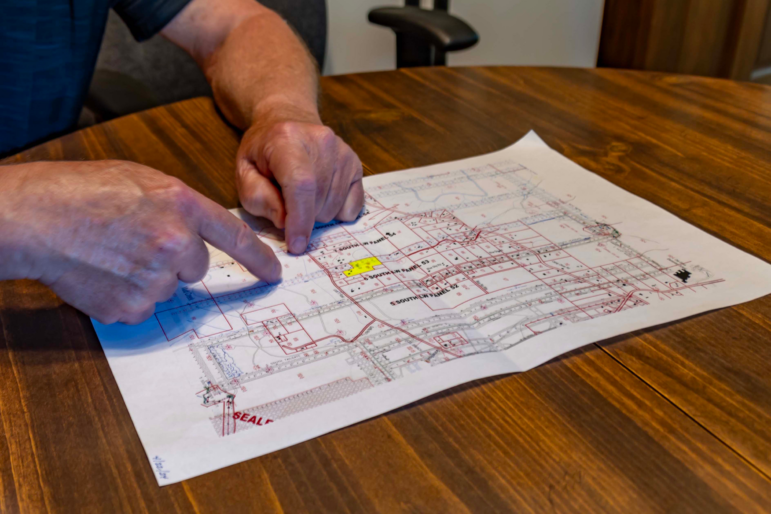
Baggett left Riley’s home once she was informed that a reporter from Inside Climate News had arrived. But family members later provided a recording of their conversation with Baggett, saying they had felt their conversation left them with more questions than answers.
Just three days before the meeting, the mine had been fined in relation to an underground accumulation of the same type of methane gas alleged to have caused the Griffice home explosion.
The day of the Rileys’ meeting with Baggett, the mine was fined twice for safety violations.
A record like that would make anyone doubt the mine’s claims, Riley family members said.
So when they began hearing that capping the well was the “ideal” course of action, they had concerns.
Methane builds up in coal seams as organic matter turns into coal, a process that can take millions of years. A threat to underground coal miners, it can also become a risk to people living atop mines, especially mines that use the longwall excavation process.
If a mining company is simply capping wells and not also venting methane, all that the mining company officials are doing is causing the methane to spread out and look for other ways get to the surface and potentially into homes, such as upward along fissures in rock, said Spadaro, of West Virginia, who has been investigating mine disasters for more than 50 years.
Once inside the house, methane can be ignited, triggering an explosion, by something as simple as a spark from a light switch or a flame from a stove or heater.
When a water well atop a coal mine is located inside the house, the situation is “very serious,” putting people in their homes at risk of death, said Spadaro. After capping, methane could move up into the home along the outside of the water well casing, the tubular structure used to maintain the well opening, getting into the home that way, he said.

When told of the situation in the Riley home, Spadaro responded with alarm: “That’s dangerous as hell. Why don’t they just buy her out and let her go live some place safely?”
Spadaro recommended that Riley pack her bags and go stay with a family member or friend as the mining approaches her home. If she stays, he said the company needs to provide high-quality methane detection monitoring with alarms.
A 2019 EPA report identified Oak Grove as one of the “gassiest coal mines” in the country.
Coal mining companies like to cap wells, but they also need to vent the methane, said Dennis Fisher, an engineer with experience in oil, gas and coal mine permitting who has been helping West Virginia coalfield residents resolve disputes with mining companies over subsidence and methane leaks in that state. In West Virginia, atop longwall mining, for example, it’s common to see homes with white pipes come up from the ground near homes to let the methane escape in a more controlled manner.
But the closer a water well is to a home, the harder it is to safely and effectively reduce the risk from coal mine methane getting into the home and putting occupants at risk, Fisher said.
When a water well atop a longwall mine is located inside a house, “there is no way you can control that situation,” Fisher said. “The home would need to be torn down.”
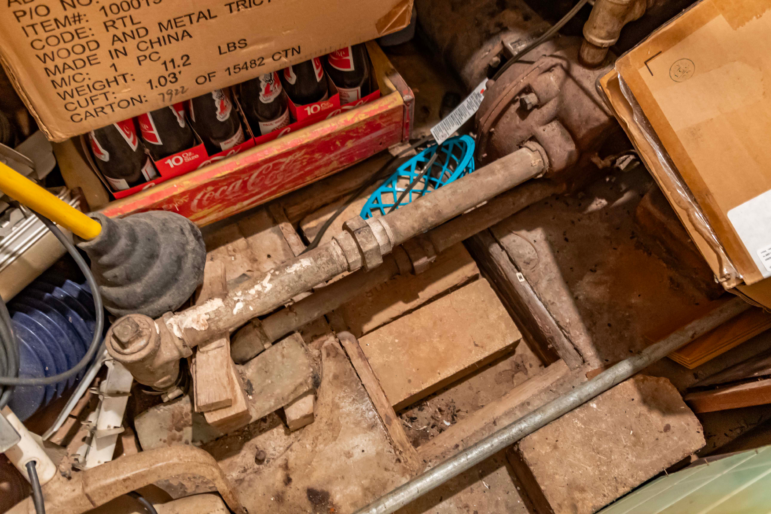
Venting methane also causes other problems by releasing a powerful heat-trapping gas into the atmosphere, Fisher said. Methane is around 80 times more potent than carbon dioxide at warming the planet over 20 years.
The situation in Alabama atop the Oak Grove Mine “has become a wake-up call” across Appalachian communities that sit atop coal mines, reminding residents and coal companies alike about some of the dangerous and costly impacts that can come with longwall mining, Fisher said.
“Coal companies are making millions of dollars,” he said. “They need to do a better job to remediate these problems.”
In his experience, Fisher said state or federal regulatory agencies “don’t seem to be doing anything” about the problems that subsidence and methane gas can create for people living atop a longwall mine.
“It’s just a frightening situation for the homeowners,” he said.
Spadaro said regulators in Alabama should be meeting with local residents and holding the mining company accountable.
Officials at the U.S. Office of Surface Mining Reclamation and Enforcement, which is charged with overseeing the enforcement of a federal law that requires some protections for homeowners from coal mining, referred Inside Climate News to the Alabama Surface Mining Commission, the state agency with the primary regulatory responsibility over surface impacts from mining.
But a spokeswoman for OSMRE said in an email that the Biden administration this month streamlined its complaint process for residents who live atop coal mines. The new rule, which goes into effect next month, removes a requirement that in states like Alabama, people need to first take their complaints to state regulators, and allows complaints to be filed directly with federal authorities. It also adds language that all complaints are to be considered requests for a federal inspection.
“OSMRE could not do its job as effectively without citizen input, which is critical for holding coal companies accountable and helping regulators ensure the protection of public health, safety, and the environment,” Sharon Buccino, OSMRE’s principal deputy director, said in a press release. “This rule will help ensure that citizen voices are heard and that their concerns regarding adverse mining impacts are addressed in a timely manner.”
A sacred place, a sinking feeling
Just a few hundred feet from Oak Grove First Baptist, there’s fresh dirt atop a grave. At its head is a polished gravestone, flowers carefully carved to adorn its upper corners.
“GRIFFICE,” it reads.
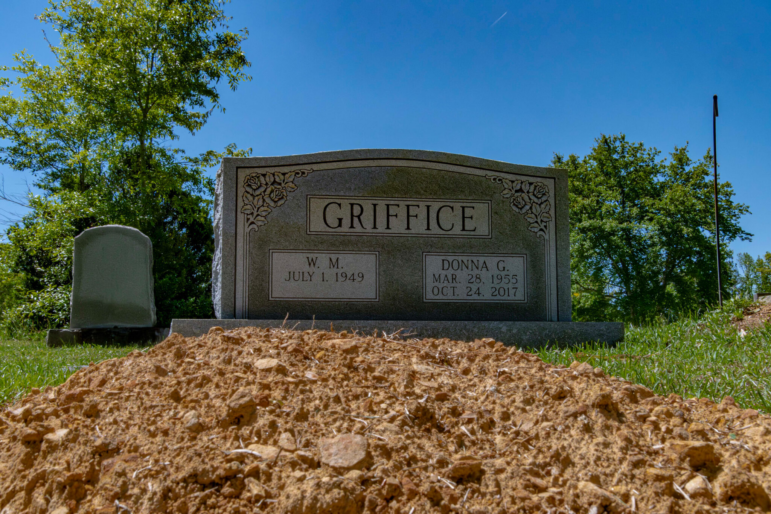
Below and to the right, the birth and death dates of Donna, W.M.’s wife, who died in 2017.
And to the left, W.M.
“July 1, 1949,” the inscription reads. His death date still hasn’t been added.
Like others with family members buried at the cemetery, Griffice’s relatives are concerned about his gravestone because of the mining that’s taken place underground.
Even in death, Griffice cannot get out of the reach of the Oak Grove Resources Mine.
At least 43 dead in catastrophic Texas flooding and dozens missing from girls camp
Flash flooding slammed the Texas Hill Country overnight on Friday. At least 27 girls from a summer camp next to the Guadalupe River remain missing.
How this long-lost Chinese typewriter from the 1940s changed modern computing
The concepts in the MingKwai typewriter underlie how Chinese, Japanese and Korean are typed today. The typewriter, patented in 1946, was found last year in an upstate New York basement.
North Korea has a new luxury beach resort. But the country isn’t open to most tourists
North Korean leader Kim Jong Un said he wants the luxury resort on the eastern seacoast to become a "world destination," but the country has been reluctant to allow in foreign tourists.
Mariska Hargitay walks a fine line in ‘My Mom Jayne’
It's natural to feel some skepticism when a celebrity makes a documentary about their own family. But Law & Order star Mariska Hargitay' tells a story that is both effective and empathetic.
Ukraine says it struck a Russian airbase as Russia sent drones into Ukraine
Ukraine said it struck a Russian airbase on Saturday, while Russia continued to pound Ukraine with hundreds of drones overnight, dashing hopes for a breakthrough in efforts to end the war.
Will Trump’s megabill help Democrats win the House?
Democrats feel that Trump's tax and spending bill gives them an opening ahead of the 2026 midterms. But if they want to win back the House, they're going to have to get their own house in order first.









